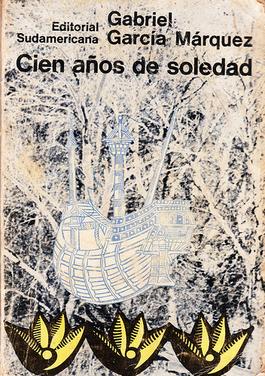One Hundred Years of Solitude

One Hundred Years of Solitude (Spanish: Cien años de soledad, American Spanish: [sjen ˈaɲoz ðe soleˈðað]) is a landmark 1967 novel by Colombian author Gabriel García Márquez that tells the multi-generational story of the Buendía family, whose patriarch, José Arcadio Buendía, founded the (fictitious) town of Macondo. The novel is often cited as one of the supreme achievements in literature.[1][2][3][4]
The magical realist style and thematic substance of One Hundred Years of Solitude established it as an important representative novel of the literary Latin American Boom of the 1960s and 1970s,[5] which was stylistically influenced by Modernism (European and North American) and the Cuban Vanguardia (Avant-Garde) literary movement.
Since it was first published in May 1967 in Buenos Aires by Editorial Sudamericana, One Hundred Years of Solitude has been translated into 46 languages and sold more than 50 million copies.[6][7][8][9] The novel, considered García Márquez’s magnum opus, remains widely acclaimed and is recognized as one of the most significant works both in the Hispanic literary canon[10] and in world literature.[1][3]
Gabriel García Márquez was one of the four Latin American novelists first included in the literary Latin American Boom of the 1960s and 1970s; the other three were the Peruvian Mario Vargas Llosa, the Argentine Julio Cortázar, and the Mexican Carlos Fuentes. One Hundred Years of Solitude (1967) earned García Márquez international fame as a novelist of the magical realism movement within Latin American literature.[11]
One Hundred Years of Solitude is the story of seven generations of the Buendía Family in the town of Macondo. The founding patriarch of Macondo, José Arcadio Buendía, and Úrsula Iguarán, his wife (and first cousin), leave Riohacha, Colombia, after José Arcadio kills Prudencio Aguilar after a cockfight for suggesting José Arcadio was impotent. One night of their emigration journey, while camping on a riverbank, José Arcadio dreams of “Macondo”, a city of mirrors that reflected the world in and about it. Upon awakening, he decides to establish Macondo at the riverside; after days of wandering the jungle, his founding of Macondo is utopic.[8]
José Arcadio Buendía believes Macondo to be surrounded by water, and from that island, he invents the world according to his perceptions.[8] Soon after its foundation, Macondo becomes a town frequented by unusual and extraordinary events that involve the generations of the Buendía family, who are unable or unwilling to escape their periodic (mostly self-inflicted) misfortunes. For years the town is solitary and unconnected to the outside world, with the exception of the annual visit of a band of gypsies, who show the townspeople technology such as magnets, telescopes, and ice. The leader of the gypsies, a man named Melquíades, maintains a close friendship with José Arcadio, who becomes increasingly withdrawn, obsessed with investigating the mysteries of the universe presented to him by the gypsies. Ultimately he is driven insane, speaking only in Latin, and is tied to a chestnut tree by his family for many years until his death.
